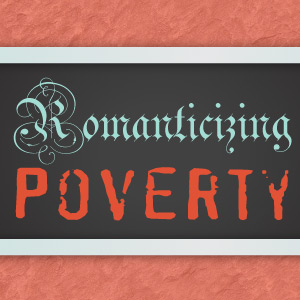The romanticizing poverty infographic shows how pop culture portrays the working-class life as free of stress and also boring.
Romanticizing Poverty
Pop culture portrays a working poor life as uncomplicated, void of stress, pure, and moral. However, working poor is not a lifestyle choice. Furthermore, romanticizing poverty makes people think it doesn’t need to change. So, don’t romanticize poverty.
Movie Portrayals of Poverty:
Deeply moralistic and contented:
- Beasts of the Southern Wild
- Slumdog Millionaire
- The Son
- Good Will Hunting
In need of assistance from a wealthy character from higher socioeconomic status:
- The Help
- The Soloist
- The Dark Knight Rises
In pop culture and fashion:
- Bohemian: pushes aside capitalist framework and also stability for what they are passionate about.
- Bourgeois-Bohemian: mimic the daily “simplicity of working poor, but without giving up financial stability.
- Dick Haynes, President and also Founder, Urban Outfitters: Urban Outfitters is for the “upscale homeless.” Nothing says homeless like the $144 “Bitching & Junkfood Algardi Velvet Swing Dress”
- The “live below the line” campaign challenged participants to live below Canada’s poverty line ($1.75 a day) FOR 5 DAYS, but with the knowledge they can return to overblown savings accounts.
Effects of Poverty
We think of working poor as a destination. It’s exotic. But that stage wears off. Furthermore, poverty shrinks your brain from chronic stress. Long-term stress shrinks the prefrontal cortex, insular cortex, and also subgenual anterior cingulate regions. All of which affect reasoning, decision-making, emotions, and also self-control. So, you’re deeper in the hole. It has the highest correlations to substance abuse, broken homes, violence, and also health problems.
Related:
- Left in a Right World
- Looking for Leaders: The Crisis in Social Work
- Poverty in America: Then and Now
- Social Workers: Who Needs Them?
- Smoke Without Fire
- Suicide Notes
- The Changing Demographics of the Welfare State
- The Faces of Homelessness Today
- The Social Impact Of Mixing Business & Medicine
- The State of Children’s Health
- The War Within: Sexual Abuse in the Military



